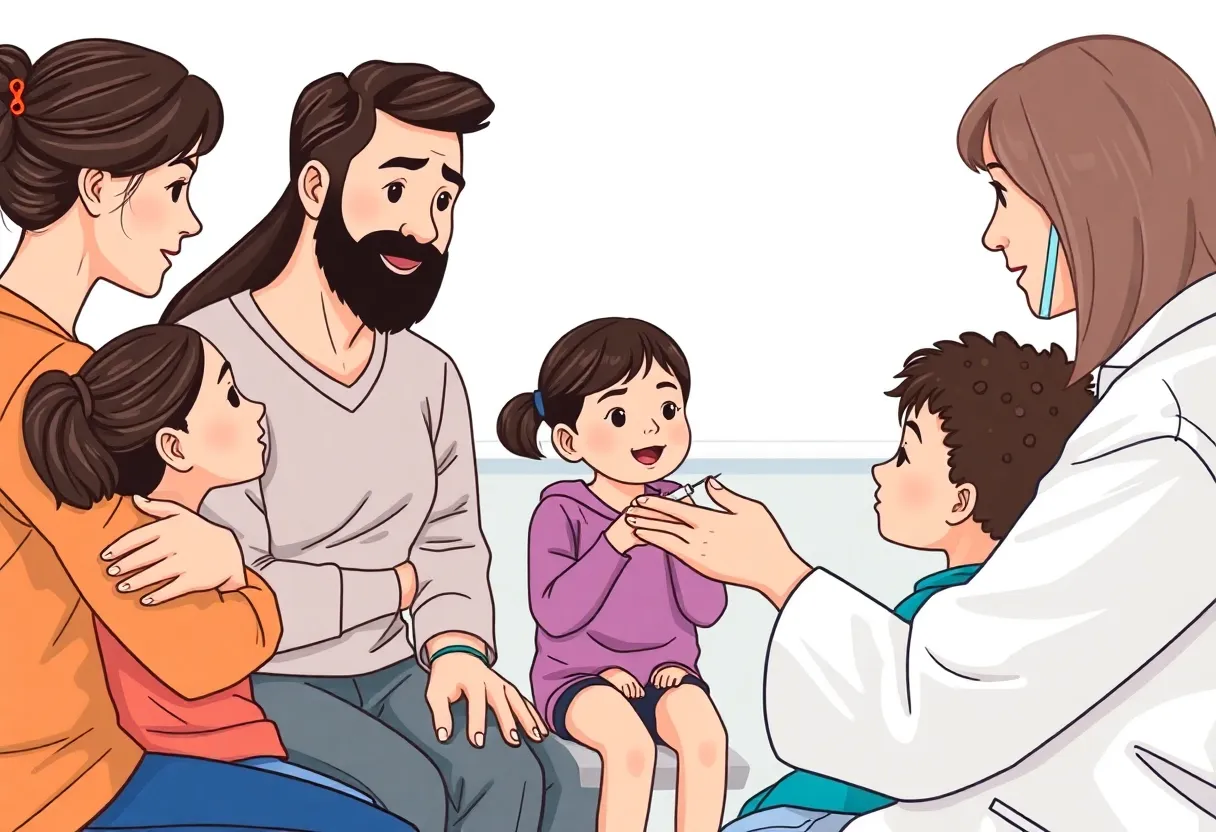News Summary
The CDC has revised its immunization schedule for children, allowing Covid-19 vaccines but recommending a shared decision-making process between parents and healthcare providers. This change follows recent announcements from the HHS, which stirred confusion regarding vaccine recommendations for pregnant women. Despite these adjustments, health experts stress the importance of vaccinations, highlighting the risks Covid-19 poses to young children. The new guidelines aim to facilitate discussions between families and doctors to ensure appropriate vaccination while navigating access issues.
CDC Updates Immunization Schedule for Children
The US Centers for Disease Control and Prevention (CDC) has recently made significant updates to its immunization schedule for children, sparking a conversation among parents, healthcare providers, and experts. This change comes on the heels of a recent announcement from the Health and Human Services (HHS), where it was stated that Covid-19 vaccines would no longer be recommended for healthy children and pregnant women.
Changes on the Immunization Schedule
In simple terms, the CDC’s new approach highlights that children aged 6 months to 17 years can receive Covid-19 vaccines, but there’s now a catch. Parents are advised to engage in a process termed “shared decision-making” with their healthcare providers. What this means is that before moving forward with the vaccination, parents should discuss the benefits and risks with their child’s doctor.
Confusion Surrounds Vaccine Recommendations
The quick updates have left a lot of people scratching their heads. Just two days after HHS shared their announcement on social media, the CDC made the changes that now leave guidance on Covid-19 vaccines for pregnant women looking a bit unclear—areas related to them are now shaded gray on the schedules, suggesting a lack of clear recommendations.
Diving deeper into the details, while the HHS has officially stated that Covid-19 vaccines are removed from the CDC’s recommended list for children and pregnant women, experts have pointed out that these vaccines are still part of the immunization schedule but under the shared decision-making framework. This means they are not mandatory, similar to other vaccines that aren’t required but still recommended.
Access to Vaccines and the Shared Decision-Making Process
The requirements for shared decision-making might complicate things for some families looking to vaccinate their children, but don’t worry—children eligible for free vaccines through the Vaccines for Children program can still get the Covid-19 shot after discussion with their healthcare providers.
One important thing to note is that while the new regulations for children are garnering attention, Covid-19 vaccines for adults remain on the CDC schedule. Pregnant women, however, find themselves in murky waters as the CDC no longer has specific recommendations for them.
Importance of Vaccination
Despite the confusion, experts have emphasized the ongoing need for vaccinations. Data suggests that young children are indeed at risk from Covid-19, with hospitalization rates for those under five years old being comparable to those seen during severe flu seasons. Alarmingly, less than 5% of children who were hospitalized with Covid-19 last season had received their vaccinations.
Public Health Concerns
Healthcare professionals have expressed relief that Covid-19 vaccines are still accessible for children, but they are also concerned about the hurdles the new shared decision-making process might create. Organizations like the American Academy of Pediatrics and other public health advocates have criticized the initial statements made by HHS, warning that such declarations can erode public trust in vaccination efforts.
Future Considerations
The recent changes in the CDC guidelines have sparked important discussions about possible gaps in access to vaccinations among children and pregnant women, particularly those at higher risk. With conflicting messages around vaccine recommendations during pregnancy, clarity is essential, especially when considering the benefits of maternal vaccination against Covid-19 throughout pregnancy. Experts continue to assert the safety and importance of these vaccines.
Conclusion
The evolving guidelines from the CDC showcase the complex dance between public health recommendations and political influence over vaccine accessibility. As families navigate this new immunization landscape, open communication with healthcare providers is more crucial than ever to ensure that children receive the preventive care they need.
Deeper Dive: News & Info About This Topic
- The New York Times
- Wikipedia: COVID-19 Vaccination
- CNN
- Google Search: COVID-19 vaccines for children
- The Washington Post
- Google Scholar: COVID-19 vaccines
- CBS News
- Encyclopedia Britannica: COVID-19 Vaccines
- USA Today
- Google News: CDC vaccine recommendations

Author: STAFF HERE AUGUSTA WRITER
The AUGUSTA STAFF WRITER represents the experienced team at HEREAugusta.com, your go-to source for actionable local news and information in Augusta, Richmond County, and beyond. Specializing in "news you can use," we cover essential topics like product reviews for personal and business needs, local business directories, politics, real estate trends, neighborhood insights, and state news affecting the area—with deep expertise drawn from years of dedicated reporting and strong community input, including local press releases and business updates. We deliver top reporting on high-value events such as Arts in the Heart Festival, Westobou Festival, and Masters Week. Our coverage extends to key organizations like the Augusta Metro Chamber of Commerce and Greater Augusta Arts Council, plus leading businesses in manufacturing and healthcare that power the local economy such as Textron Specialized Vehicles, Cardinal Health, and Nutrien. As part of the broader HERE network, including HEREAtlanta.com and HERESavannah.com, we provide comprehensive, credible insights into Georgia's dynamic landscape.


